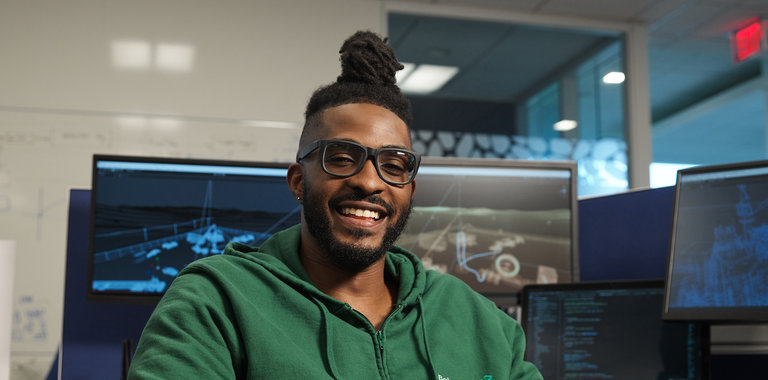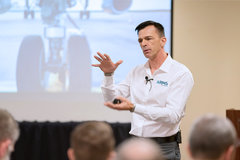- Q&A with Carlneil Domkam, from theBaker Hughes ASPIRE program, in Engineering. He is based at the Engineering Innovation Center in Oklahoma City.
Q: Could you please tell us a little bit about what you are currently working on, how you use technology on a daily basis?
I primarily work on machine learning algorithms, toward computer vision. Basically, we are developing algorithms that teach computers to see and understand what’s going on in their environment.
In the oil and gas sector, we are looking for ways to use these techniques to reason with what’s going on at well sites, so that we can better understand what our customers are looking for, or what they might need in order to optimise their operations.
例如,计算机视觉可以使无人权力的供应商验证合同 - 检查按计划的计划发生的交货,或帮助确保操作员的网站安全。
Q: So, you are basically making computers see?
Yes, effectively. You connect a camera to the computer, streaming images, and then manipulate them to see that it exhibits patterns, since we know that is going on in the image.
Our brain does something very similar actually.
Q: Can you perhaps explain this a little more?
With Machine Learning, we create a model with simple operations that happen over and over again when trained.
我们的大脑本质上是由与途径连接的神经元组成的。随着时间的流逝,神经元对某些任务进行了优化。例如,在看到不同类型的椅子之后,您就可以将对象识别为椅子,因为您的大脑由于重复和学习而识别出来。
Computers do the same.With a bunch of data over time, the computer can reason with chairs it has never seen before, based on what it has seen in the past.
Q: Looking at the potential of Machine Learning, what are you most excited or intrigued about?
I think it has the potential to accelerate a lot of processes that go on in an organisation. A lot of things are manual—subject to human error. This technology, specifically for contract verification, for example, can take the extra work off operations employees, to enable them to put their effort on higher priority tasks, therefore ultimately increasing efficiency of a business.
You can imagine, once scaled up to other processes, how much more efficient we could be leveraging these technologies.
Q: I heard that in your spare time you also use Machine Learning to create music. Could you tell us a little bit about that?
Primarily in rap music, yes, but also other things. I use all of this stuff to help me develop and produce. For people who are creative, you can often find yourself in a rut. But if you listen to something you like, it can bring you out.
The potential of Machine Learning—not just in the creative arts, but also when applied to dancing, software, and writing—has a lot of applications. AI can learn from a model learning on previous things.It can bring you new experiences, in turn. Like a ‘writer’s block’ helper I guess.
Q: Tell me more…
Machine learning takes music in a specific format and converts pitches into numbers for the model to understand them. You can then feed it a pattern, a melody, let's say, or notes with different pitches or drum beats. And if I train it over time, it can scope and build around a new sound. It helps with the creative process.
这是我使用此技术创建的歌曲的示例:https://soundcloud.com/user-491319306/machine-learning-song
问:那么,这是您在工作之外做的事情吗?
I have always been very intrigued by the way music can make you feel.
For example, lifting weights in the gym can be really dull without music, yet ‘the Eye of the Tiger- Rocky’ music comes on and can hack someone’s mood. That’s neat.
How our brains encode this information to then inform our mood to be positive or negative, that is what I am interested to better explore and understand, thanks to this technology.
That’s where Machine Learning has the edge over our brain. The way we think about things takes a lot of details. We operate on feelings and emotions as it is easier for us to process. So, Machine Learning can be like a little helper to get through all this data quicker.
Q: Finally, as we are thinking about the future of tech, do you have any message for our readers to better understand the potential of tech in the future of energy?
For me, it is really cool to have all these tools that make our life a lot easier. But we have to be careful about how we use them.I do worry about how these sorts of technologies will be implemented, for example, when we talk about security, making sure people’s privacy is protected and not infringed upon.
A lot of companies are getting into this space and should be thinking about it.
My 2 cents.
Energy Forward Stories
Sign up to stay up to date on the latest innovations and people shaping the future of our industry.




